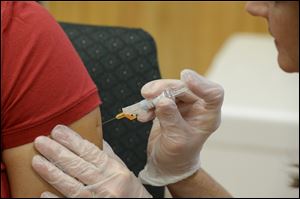
Doctors have duty to treat nonvaccinated children
9/2/2017

Doctors have a duty to treat kids with parents who won't listen to their advice.
We in the medical community believe wholeheartedly in the prevention of all illness, especially by vaccination.
Science and history continue to show that vaccination dramatically decreases both the mortality (death rate) and morbidity (severity of illness) of infectious diseases.
More than 98 to 99 percent of the general population agrees with those conclusions.
Yes, it is absolutely frustrating when parents refuse to follow our advice and protect their children. But, the law respects the right of a parent to not vaccinate his or her child, and we as health professionals should respect the law.
Our primary objective as health professionals is to protect children of all colors, religions, and backgrounds, whether we agree with their parents’ decisions or not.
But, there is a growing trend among us to discharge or “kick out” children from our medical practices because their parents have chosen not to vaccinate them.
There are two illogical arguments used in this decision to discharge these unvaccinated (or “slow vaccinated”) children:
1. Because parents do not agree with our recommendations to vaccinate their children, we can do no more for them, so we should “wash our hands” of the problem.
Yet, we don’t do this with other families in our practice whose children are unhealthy as a result of a parent’s decision. When an obese child remains that way for months to years, despite our recommendations to improve his or her lifestyle, we do not discharge those children and families. We keep an open dialogue to continue to try and help.
When we tell parents over and over again that they should stop smoking; that second and third-hand smoke is a health risk for their children, and yet they continue to smoke, we do not discharge them from our practices. We keep an open dialogue.
How about the parent who decides not to complete all of the antibiotics that were given, because “my child didn’t need them”? We don’t discharge those families from our practice.
Obesity, parental smoking, and drug noncompliance comprise more than 60 percent of our patient populations. If we discharged all of these children from our practice just because they didn’t do everything that we told them to do, we’d be out of business.
2. Nonvaccinated children pose a risk to babies and other immuno-compromised children in our office.
In reality, the overwhelming majority of childhood infections occur in our homes, schools, day cares, churches, malls, restaurants, airports, amusement parks, and, yes, even in our hospitals; not in medical offices.
How will discharging these children from our medical home prevent an overwhelming exposure to the general population? It won’t.
And, who will take care of these nonvaccinated children when and if they do become sick? Where will they go? They’ll go to the already busy emergency rooms and urgent cares where they will be exposed to not only other babies, but older children, adults, the elderly, and those with a weakened immune system (e.g., cancer/chemotherapy).
By keeping an open dialogue with these families, we can continue to emphasize the importance of preventative medicine (immunizations), as well as monitor their children for signs of infectious diseases. By keeping these kids in our practice, we know which children are vaccinated and which are not, and we can adjust office visit times (or keep them at home) to minimize exposure to those more susceptible infants and children.
The law protects the parent’s right to not vaccinate his or her child. If we don’t like the law, then we should change it, not declare our own martial law. Our ethical duty is to protect all children, not turn our backs on some.
We, as health professionals, need to be objective and logical and prevent our emotions from affecting our decisions. To quote the philosopher, and physician, William James: “A great many people think they are thinking when they are merely rearranging their prejudices.”
Dr. Michael D. Pappas of Berkey is board certified by the American Board of Pediatrics in both general pediatrics and pediatric critical care medicine.